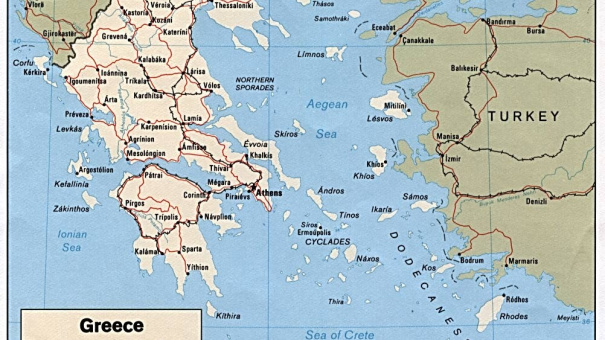Greece
Confusion, uncertainty, and a “wait and see” attitude now dominate the political atmosphere in Greece, as the Troika of creditors increase the financial pressure on the country, no agreement is in sight and the goal of a “honest compromise” set by the Tsipras government seems more distant than ever. A kind of unstable “terror” equilibrium seems to reign between Greece and its “creditors” who are also its colonizers, by economic means. As for Tsipras, under pressure from all sides, he is trying to find some “oxygen,” visiting Moscow this week and making overtures to China and probably Iran.
Germany fears the cost of an open crisis which would probably lead to Greece defaulting on its debt, if not exiting from the eurozone. The Greek government on the other hand cannot accept the continuation of the Troika program imposed on the country since 2010 – SYRIZA and ANEL exist solely thanks to their opposition to it. But the government also does not want an open clash with its creditors as such would be a serious and complicated matter, given the correlation of forces, the destruction already suffered by Greece, its dilapidated state structures and the geopolitical threats it experiences. It could prove even more difficult and dangerous because the SYRIZA leadership has prepared well neither itself nor the nation for such a prospect. But if the creditors insist on their line, such a conflict seems more and more necessary for saving and liberating the nation.
The overwhelming majority of Greek people have supported the new SYRIZA/ANEL government from the beginning for rather obvious reasons, which have not so much to do with party or ideology affiliations, but rather with the nation's fundamental need to stop the application of the program imposed in 2010 and thereafter renewed. Greeks were delighted at the first government gestures because they felt their country regaining at least a part of its dignity – for the first time in five years they felt that Greece has a government of its own, not a puppet of an alliance of Germany and the “markets” (the international financial capital). They would even be ready to make sacrifices, especially if they felt that their leaders had a coherent program and strategy.
Greeks still support their government in very large numbers although this support is diminishing due to the contradictions and lack of a coherent strategy in negotiations with creditors, as well as contradictory statements from government ministers on a number of various issues. Such contradictions betray the lack of political unity concerning a new vision for the country and a coherent political program for its renaissance.
It is good to remember that Greece has experienced an economic and social catastrophe during the last five years unprecedented for European capitalist countries after WWII. Not only did the program imposed by the Troika fail to redress the grave problems of the country, but Greece has lost 26% of its GDP – an amount more than that of France or Germany during the First World War. Unemployment has skyrocketed, and the health, education and pension systems are destroyed. The morale of the population and its confidence in itself and its nation have been heavily wounded. By obliging Greece to pay a non-viable debt and by imposing on it extreme colonialist terms, they have transformed a relatively sovereign and independent state into a “debt colony.”
Now, the “creditors,” that is, an alliance of international finance and German leadership, followed by other European elites, controlled as never before by the “Finance International,” not only refuse to recognize their extremely serious, catastrophic mistakes (if we can really speak about “mistakes”) but they insist on continuing the same policy, essentially renouncing all serious concessions.
